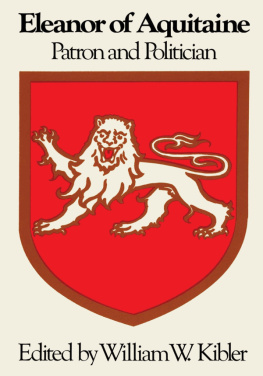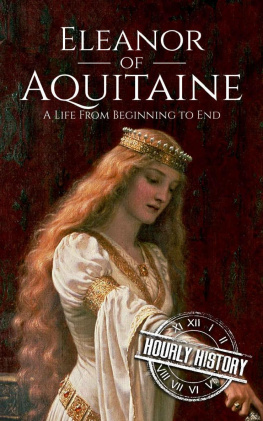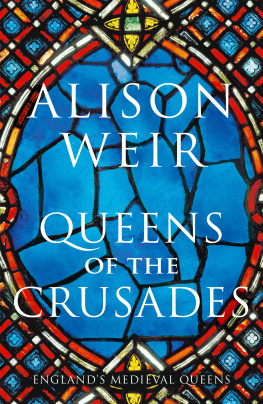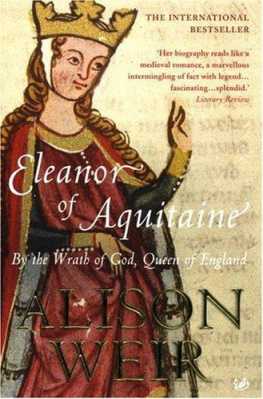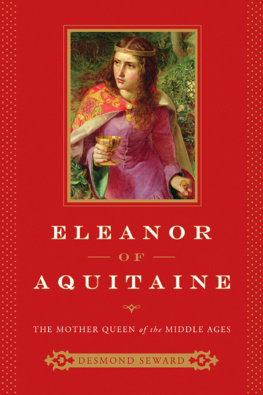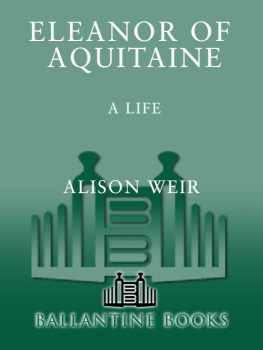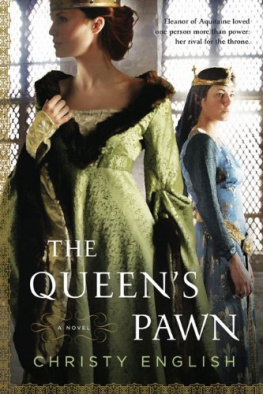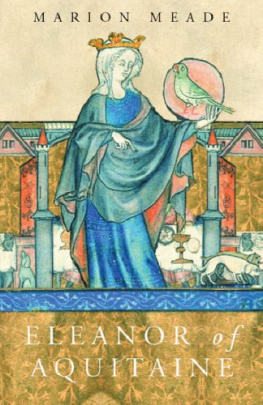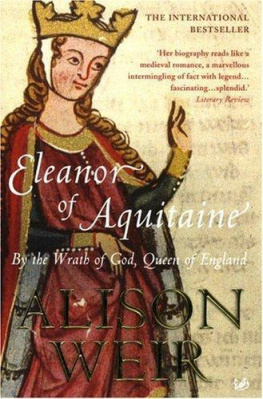ELIZABETH A. R. BROWN
Eleanor of Aquitaine was an extraordinary person, who has intrigued a remarkably varied group of writers and commentatorsgossipmongers, serious historians of literature and of political and institutional development, and the most romantic of novelists. Exaggeration and anachronistic fantasy are apparent in many of the accounts of her life, suggesting that those who have observed and studied her have not done all they might to establish sound foundations for their statements. The process of gaining reliable information and reaching satisfactory conclusions about her is, indeed, exceedingly difficult, and the tendency of those who have studied her to trust their imaginative insights more than is perhaps warranted is understandable. H. G. Richardson, dedicated scholar and archivist that he was, saw the chief problem as arising from historians failure to deal with the not inconsiderable bulk of record material.
The work of many modern historians demonstrates the second failing,
Such evaluations as these must be disregarded if Eleanor herself is to be understood. Scanty and disordered as the evidence may be, it is still possible to use it to discern the woman who lived, bore children, and ruled eight centuries ago.
In terms of centennials Eleanor would, I feel sure, be happy that a symposium was held to celebrate her importance in April of 1973 rather than a year later: 1173 was for her a far more pleasantly memorable year than 1174. The earlier year found her raising resistance in Aquitaine as, supported by her sons Henry, Richard, and Geoffrey, and by her former husband, Louis VII, she led the attack against her husband, Henry II. Then were manifested the traits that seem most characteristic of herher passionate courage, her determined control over her offspring, her tenacity, her cleverness. The following year found her in England, her husbands prisoner, destined to remain for a decade and a half the instrument of his will and not to re-emerge until 1189 as the influential figure she had formerly been. In 1173 various facts were demonstrated: first, that Eleanor loved power and the machinations of politics; second, that in her the domineering rather than the nurturant side of motherhood was strongest; third, that she was far more concerned with the realities of political life than with matters cultural and intellectual.
Though it may be easiest to describe the adult Eleanor and to isolate her aims and interests at that period of her life, her background and childhood cast light on the adult she became and provide a perspective
It is worth dwelling on the deeds and characteristics of William IX, since his actions and attitudes seem to have affected Eleanor as both child and adult. William became duke when not yet fifteen, and, despite the difficult circumstances of his accession, he managed to establish control over his lands. A participant in the First Crusade, he was better remembered in his own times for his territorial ambitions, directed chiefly against Toulouse, In any case, authority in the cloister, like activity in the bed, left masculine control of the worlds affairs unimpaired.
Eleanors mother and father were far less flamboyant and impressive, and apparently far more moralistically inclined, than William IX. William X was linked with Cercamon and Marcabru, two poets of Finamors who were not beyond sermonizing and whose outlooks were distinctly more restrainedalthough not necessarily less misogynisticthan those of William IX.
Eleanor became duchess of Aquitaine and countess of Poitou at the same age as her grandfather had become duke and count, and, coincidental as this may be, her later life shows the influence of his traits of character, values, and accomplishments. Like him she was determined, independent, and jealous of any threat to her power. Like him she hungered for Toulouse and spent great effort trying to secure control of the area. Like him she went on crusade. She too supported Fontevrault, but her dedication to the house was different in quality, intensity, magnitude, and duration from that of William, and it seems clear that she found in that citadel of feminine authority a source of inspiration and reassurance. Henry II may, at a later date, have wished and even attempted to put her safely away within its walls, but she was not to be relegated to the status of her grandfathers wives. Her hesitant attitude toward her roles as female and mother may well be connected with William IXs tendency to treat women as objects, an attitude reinforced by the moralizing misogyny of William Xs poets. A spirited and sensitive woman exposed to these views might well be led to question the value of and finally reject traditional female goals and to turn to masculine spheres of activity to demonstrate her influence and importance. She certainly did nothing to patronize or propagate the work of the finamors poets whose views reflected her grandfathers antifeminist biases.
Eleanors feelings about herself and her sex must have been affected, not only by her grandfathers attitudes, but also by events occurring in the years after her fathers death. At first, all went well. William X had
There were, however, darker sides to the picture. Eleanor resented rival influences, and she openly derided Thierry Galeran, an adviser Louis had inherited from his father.
Maternal concerns could not fully occupy Eleanor, and her decision to take the cross and accompany her husband on crusade, made in the spring of 1146, was probably the culmination of interest in the expedition aroused at the time it was first discussed, in December 1145. and it is difficult to imagine that the granddaughter of William IX would not have been an enthusiastic advocate of a project in the tradition of Williams earlier enterprise.
Eleanor was twenty-five when the crusading army left for the East in the summer of 1147, and the two years between the armys departure and its return marked for her a period of readjustment of ambition and perspective. In Constantinople she was exposed to the glories of the Byzantine court; later she encountered the dangers of battle; in Antioch she renewed acquaintance with her uncle Raymond of Antioch, only eight years older than herself, a handsome, cultivated prince. The nature of the suspicions and their foundation in fact are at this remove impossible to fathom, but, when Louis determined to depart for Jerusalem rather than assist Raymond in attacking other objectives, it became clear that Raymond did not want to be separated from Eleanor, nor she from him. Louis insisted that she come, and he was met with her stinging retort that their relationship was totally illicit because of the blood ties linking them. The king might well have left her on the spot had it not been for his counselors, particularly Eleanors enemy Thierry Galeran. They convinced the king to take a firm stand and force Eleanor to accompany the royal host. The queen was bested, and the incident gives a foretaste of later occasions on which her aggressive, headstrong determination resulted in decisive, if temporary, defeat.
However fiery her attack on Louis, Eleanor was outwardly docile for the next four years. She accepted the peace the pope arranged between Louis and herself on their return to the West, and she dutifully produced another daughter, Alix.
Physical attraction and a thirst for power drew Eleanor and Henry together, despite the eleven-year difference which separated the queen and the young count. Eleanors prestige, authority, and widespread holdings offered Henry the prospect of valuable and much-needed assistance, for he was determined to win the kingdom of England, a goal he had cherished for a decade, since he was nine. Henrys attitude toward marriage, wives, and women in general was, as later events showed, indelibly affected by his fathers example, and he may well have hoped from the outset to be able to control Eleanor as his father had managed his own mother.

